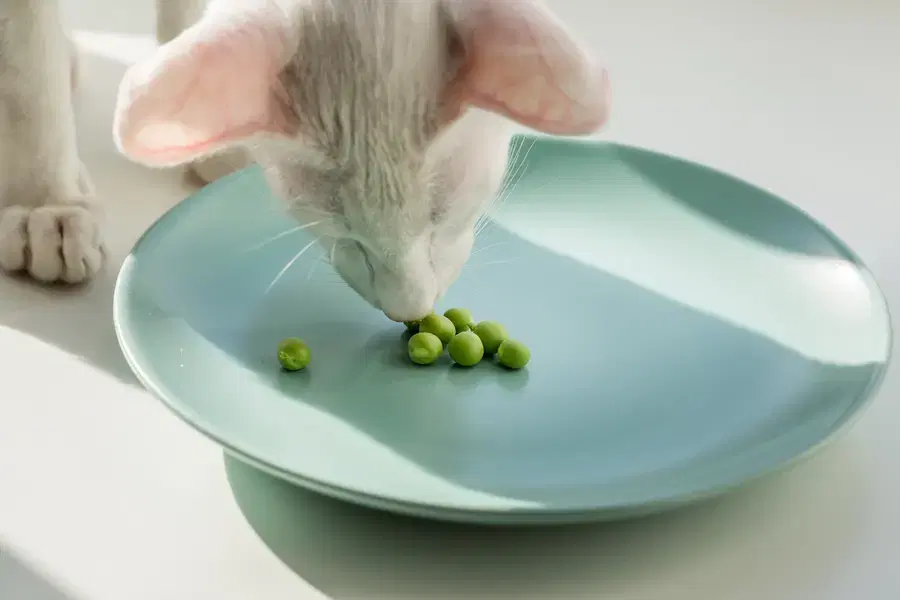Do you find yourself wondering whether your cat would enjoy eating peas? The answer isn’t too complex - some cats may enjoy it while others wouldn’t. If you like eating peas, then your cat might also show curiosity and interest and want to eat a pea or two - that’s normal!
If your cat seems eager to try it out, you can offer them a single pea and see how they respond. Who knows, your fur baby might just develop a liking for it. But remember, it’s not healthy to feed cats peas off your plate if you’re eating them with salad dressing or any sort of seasoning, as they can contain sodium and harmful fats.
Can Feeding Peas To My Cat Offer Health Benefits?
Unfortunately, research suggests that cats do not have the enzymes in their digestive tracts to be able to digest fruits and vegetables the way we do. They simply aren’t able to extract all the essential nutrients from them. The same might go for carb sources such as peas.
However, peas do contain fiber, which cats can benefit from, especially if they have digestive issues such as diarrhea or constipation. But that doesn’t mean you can feed lots of peas to your feline buddy as that could lead to other issues! It’s best to offer a few, unseasoned peas along with their regular food to avoid troubled tummies.
Peas can also help in preventing dehydration as they contain about 79% water - so go ahead and let your cat try it in small, safe quantities.
What Is the Best Way to Feed Peas To My Cat?
The safest way you can feed peas to your cat is to offer them frozen or fresh peas without any seasonings or additives. In case your fur baby has any dental or oral issues, then you can simply mash the peas after cooking. Just keep it simple! You can make mashed peas for kittens as well since they don’t yet have developed enough teeth to bite into them.
If it’s a hot day, then you can try giving your cat a frozen pea to see if they take it as a cooling treat - that’s a possibility too! But remember to thaw the peas slightly so that they aren’t too hard, and to avoid any choking hazards.
Don’t forget to remove the peas from their pods. You can end up making silly mistakes sometimes, especially when you’re new to all the paw-parenting, but this is important. Canned peas are best kept away from your little feline buddy - they can contain a lot of sodium and we don’t want to take unnecessary health risks. You can also find ways to add a few peas to your cat’s pet-friendly, home-cooked treats and cat foods, especially if you’re making stews out of lean meats.
Can I Feed Chickpeas to My Cats Instead?
Any kind of vegetable protein by itself is not sufficient for your feline baby. Your cat is an obligate carnivore, which means most of the nutrients should come from animal protein. Yes, you can always argue that chickpeas are high in protein - but that’s for us humans!
Your cat doesn’t contain the necessary amino acids to be able to digest chickpeas. Moreover, chickpeas contain magnesium, potassium, and folate, but the amounts aren’t high enough for your cat to get complete nutrients. So, it’s better to look for alternatives - it’s okay to feed them to your cat to quench their curiosity, but don’t offer it to your cat thinking that it’s going to fulfill their dietary needs.
Moreover, chickpeas are quite difficult for cats to digest! If you do want to feed it to your cat (and there isn’t any reason to since most of the protein they need can be found in meats and commercial cat foods), then make sure that you prepare them properly and that they are soft and mushy enough for them to eat and be able to digest.
Can My Cat Be Allergic to Peas or Chickpeas?
It’s best to speak to your vet first, who probably has a more up-to-date medical history than your little buddy. Only feed your cat peas if the vet gives you an okay. Even then, it’s crucial to look out for any signs of an allergy or irritations. With any vegetable or grain, including peas and chickpeas, there’s always going to be a possibility of sensitivities or allergies in the form of digestive issues, hair loss, loss of appetite, or skin irritation. For more information, check out our guide on skin conditions in cats. It’s best to be alert about these signs, and if your cat is experiencing any of these symptoms, you should contact your vet immediately. It’s also possible that the allergy may develop over time and may not be very apparent in the first few bites or tablespoons. So just look out.
How Spot Pet Insurance Can Help
At Spot Pet Insurance, we know that unexpected accidents and illnesses can happen at any time. That’s why Spot offers accident and illness and accident-only plans that offer pet parents up to 90% cash back on eligible veterinary bills. Spot’s plans are customizable so you can create a plan that will fit the needs of your pet and your budget. Choose your deductible, annual limit, and reimbursement from a range of options. Get a free quote today!
The information presented in this article is for educational and informational purposes only and does not constitute or substitute for the advice of your veterinarian.
